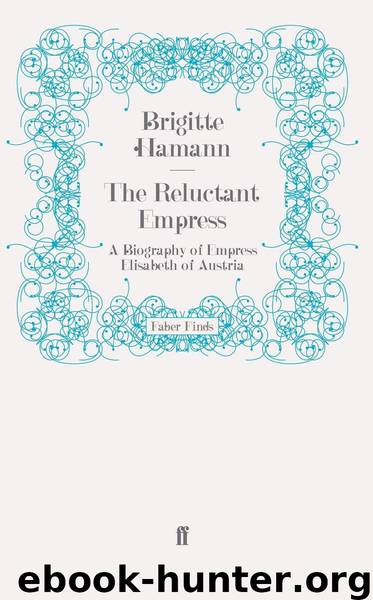B008AITH44 EBOK by Hamann Brigitte

Author:Hamann, Brigitte [Hamann, Brigitte]
Language: eng
Format: mobi, epub
Published: 0101-01-01T00:00:00+00:00
After one of her conversations with the Empress, Marie Festetics’s diary notes, “She is not at all banal, and one can sense her contemplative life in everything she says! How sad that she fritters away all her time with brooding and has no need to do anything. She has a talent for intellectual activity and altogether a thirst for freedom which finds any limitation terrible.”32 Over and over, the lady-in-waiting praised Elisabeth’s human warmth and her outstanding intellectual abilities, which revealed themselves in an often sarcastic but always apt wit. But Marie Festetics also saw the negative traits: “In ‘Her’ there is everything, but as in a disordered museum—pure treasures, which go unused. Nor does she know what to do with them.”33
On the other hand, the Countess had complete understanding for the Empress’s rejection of the court. As long as Marie Festetics was in Vienna, she criticized the emptiness, formality, mendacity of life at court: “a life that destroys the spirit.” She regretted that “the futility—the decay of life values is felt nowhere so strongly as at a court, once one accustoms oneself to the outward brilliance and becomes so well aware of how it merely lends glitter to the rot, like the golden tinsel on the Christmas nuts and apples;—how well I understand the Empress’s frustration.”34
But complaints of this sort were hardly sufficient reason for the Empress to leave Vienna for such long periods. There must have been other, more compelling grounds, which we can only guess at. It was precisely during this time of Elisabeth’s absence that Vienna underwent a total reversal in foreign policy. Beust, the former chancellor and foreign minister, was dismissed. His successor was none other than Gyula Andrássy, who had been aspiring of this office (with Elisabeth’s forceful support) since 1867. No documents from this period exist to prove any influencing control on Elisabeth’s part in Andrássy’s favor. Other factors were in play as well, especially Beust’s rather belligerent attitude during the Franco-Prussian War, while Andrássy favored a neutral position for Austria-Hungary—and made his view prevail.
In any case, Andrássy saw himself as the savior of the monarchy. Very similarly, Elisabeth later stated in a poem that in 1871, Andrássy had “pulled the carriage out of the mud.”35 He formulated an entirely new policy. While Beust had been Bismarck’s great antagonist, Andrássy now sought to find an understanding with the German Empire, thus complying with Bismarck’s intentions. Both—Bismarck as well as Andrássy—worked toward the great goal of reconciling the enemies of Königgrätz and to conclude a German-Austrian alliance. This objective was realized in the Dual Alliance of 1879.
Precisely what happened to cause the dismissal of Count Beust and the appointment of Andrássy is not clear to this day, in spite of extensive research.36 The principal open question concerns the role played by Elisabeth in the appointment. That she kept her distance entirely is hard to believe. For even in later years, she made her aversion to Beust and her agreement with Andrássy’s policy only too clear.
Download
This site does not store any files on its server. We only index and link to content provided by other sites. Please contact the content providers to delete copyright contents if any and email us, we'll remove relevant links or contents immediately.
B008AITH44 EBOK by Hamann Brigitte(192)
PERCY JACKSON DEMIGOD COLLECTION by Rick Riordan(184)
Jack by Tony Bertauski(122)
Billy Stuart and the Sea of a Thousand Dangers by Alain M. Bergeron(86)
THE HEROES OF OLYMPUS 02 - THE SON OF NEPTUNE by Rick Riordan(81)
Disney Princess: 5-Minute Princess Stories by Unknown(79)
Grandma Panda's China Storybook by Mingmei Yip(78)
A Destiny Found by H. M. Gooden(74)
Paladin (The Dragonrider Heritage Book 7) by Nicole Conway(73)
Mega-Awesome Adventures by Rick Riordan(71)
Sophia the Flame Sister by Amber Castle(67)
Snow Witching White by Allie Burton(67)
The Weirdstone of Brisingamen and the Moon of Gomrath by Alan Garner(65)
Accidental Legend by Derek Power(65)
Prophecy of the Seer: A Norse Mythology Adventure (The Eura Chronicles Book 4) by K.N. Lee(63)
Neon's Secret Universe by Sibéal Pounder(59)
Neverland 2.0 by Lauren M. Flauding(59)
Faerie Emergence (Titania Academy Book 8) by Samaire Wynne(59)
Wizard's Guide to Wellington by A. J. Ponder(59)
